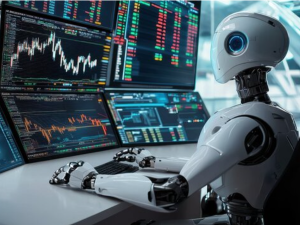In the past decade, artificial intelligence technology has quietly penetrated into the global financial market like an unstoppable trend, gradually changing the rules of the game on Wall Street. Especially in the field of quantitative investment and algorithmic trading, the application of AI has not only greatly improved investment efficiency, but also led to an unprecedented industry change. Today, let's take a deep look at how artificial intelligence can show its prowess in quantitative investment and algorithmic trading.

In the past decade, artificial intelligence technology has quietly penetrated into the global financial market like an unstoppable trend, gradually changing the rules of the game on Wall Street. Especially in the field of quantitative investment and algorithmic trading, the application of AI has not only greatly improved investment efficiency, but also led to an unprecedented industry change. Today, let's take a deep look at how artificial intelligence can show its prowess in quantitative investment and algorithmic trading.

How AI changes quantitative investment
The essence of quantitative investment is to use mathematical models and data analysis to formulate trading strategies. In the past, these models relied on statistics and computer computing power, but in recent years, the application of AI, especially machine learning, has made these models smarter.
The reason why artificial intelligence can have a revolutionary impact on quantitative investment is due to its ability to process and analyze large-scale data. Today, the data in the financial market is not only stock prices and company financial reports, but also news reports, emotional changes on social media, and even geopolitical risks. AI can extract useful information from hundreds of millions of market signals like a tireless analyst and make trading decisions in real time.
Machine learning models are particularly good at identifying nonlinear relationships in data. This means that AI can capture investment opportunities that are difficult to discover with traditional quantitative methods. For example, some hedge funds have used AI to find subtle patterns in thousands of variables, thus achieving more accurate market forecasts than traditional models.
Behind quantitative investment: the rapid development of algorithmic trading
If AI is the new darling of Wall Street, then algorithmic trading has long been the driving force behind the financial market. Algorithmic trading refers to the automated execution of trading strategies through preset rules and conditions. Its advantages are not only fast trading speed, but also avoiding the interference of human emotions.
Artificial intelligence has taken algorithmic trading to a higher level. High-frequency trading companies rely on AI and low-latency technology to capture tiny fluctuations in market prices within milliseconds and conduct large-scale transactions. High-frequency trading companies have taken the lead in the competition with their advanced technology. AI can also optimize algorithms and reduce transaction costs by analyzing trading behavior in the market.
Not only high-frequency trading, AI is also changing the strategy of long-term investment. Some investment companies have developed an AI-based intelligent order execution system. This system can monitor market conditions in real time and adjust the execution time and size of orders to obtain the best price. This intelligent transaction execution method avoids the excessive impact of large transactions on market prices, making the operations of institutional investors more covert and efficient.
Looking back to finding trading opportunities
Today, whether it is traditional value investment, large mutual fund companies or even hedge funds that focus on trading, they are all looking for new opportunities brought by AI. For fund companies, their main focus is still investment. The current main application of AI is to assist manual investment decisions, which requires asset management companies to have strong comprehensive strength in data processing, companies and data modeling.
McEnley, an investment analyst at Bamilie Gifford, said that considering the current explosive growth of data and the improvement of computer performance, it is very necessary for asset management companies to fully consider the potential of AI. McEnley believes that the potential of AI is huge, and it is necessary to conduct thorough research now. According to him, Bamilie Gifford is trying to decompose the investment research process and explore which steps can be completed by AI. If it is found that human labor is time-consuming and labor-intensive, but the effect is not as good as that of machines, it will consider using AI.
In the stock selection link where it is good at, Bamilie Gifford has begun to explore artificial intelligence. The company is testing an algorithm system to determine which investment style is more suitable for a certain stock. Its international stock investment team is considering using this algorithm to screen stocks that meet certain specific requirements, such as whether they meet a certain sales volume or profit requirement. In stock screening, AI can take into account multiple screening conditions and assign weights to each screening condition, which is better than manual stock selection. The stocks screened by this algorithm can bring considerable inspiration to the research team and prompt them to conduct further research and discussion. Some hedge funds focus on AI to simulate their past glory. Steven Cohen, the founder of 72 Point Asset Management, known as the "King of Hedge Funds", hopes to find the connection between past successful transactions through AI to help him replicate these trading results in the current market. He asked AI to review the position, risk exposure and leverage level of each transaction, as well as the trading timing at the time, and evaluate the pricing level and liquidity of the market at the time. In this way, the system finds similar successful trading cases and makes subsequent investments based on them.
AI strengthens efforts to improve cybersecurity and detect fraud
AI can synthesize large amounts of information to help institutional investment firms improve system security and combat financial fraud. By improving data analysis and pattern recognition, AI can help institutional investors stay away from threats and criminal behavior.
Anomaly detection can point out unusual behavior and suspicious patterns that may threaten normal network activities. AI can also detect and prevent intrusions into institutional investment frameworks, including malware and phishing, helping companies improve their response speed to emergency incidents and identity management issues.
The same tools can also root out fraudulent activities at the institutional level. AI continuously monitors trading activities such as spoofing, pump and dump trading, wash trading, insider trading, money laundering and identity theft.
AI improves liquidity in financial markets
Liquidity and cash flow are particularly important for institutional investors. AI plays a vital role in increasing liquidity and cash flow by refining strategies, making trading more efficient and providing investors with more flexibility.
High-frequency trading algorithms can complete astronomical transactions in record time, allowing institutions to profit from tiny price differences. They adjust in real time based on market conditions and set buy and sell prices.
AI also enhances asset allocation, data analysis, risk modeling, and smart order routing, leading to faster trade execution. Automated solutions can increase liquidity, giving institutional investors access to more capital and greater profits.
AI Reduces Operating Costs and Expenses
AI is helping companies save money across the board by automating routine manual tasks, streamlining complex trading activities, and strengthening compliance standards.
AI solutions enable companies to automate risk management and client reporting, while robo-advisors help brokerages enhance account holders’ trading strategies, identify undervalued assets, and recommend selling them, thereby increasing profitability.
Automating routine tasks can also reveal redundancies and inefficiencies that plague employees, freeing them up to take on greater responsibilities while routine, manually performed tasks take up their time. AI can do all of this at a fraction of the cost of hiring additional staff.
The inflection point for AI in financial markets has already occurred. Algorithmic elements are integral to investment strategies, and AI is refining these elements every day. Proactive companies that anticipated this wave have already achieved operational and profit improvements.
Therefore, for institutional investors that have been holding back, the time may have come to integrate AI into their operations.


